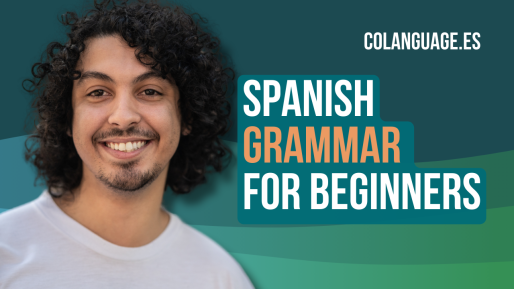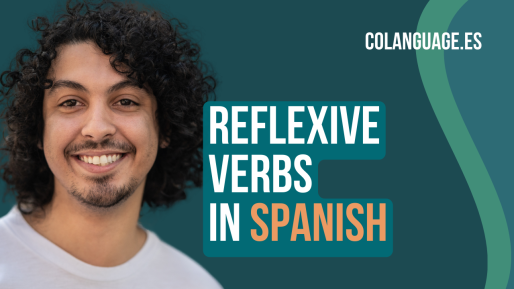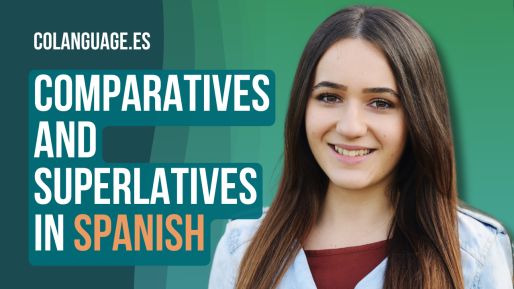Imperative mood (commands) in Spanish Share Copied!
Spanish Tener una mascota A1 At home
In this lesson, we are going to learn about the imperative mood in Spanish. We use the imperative to tell someone what to do or not to do. Let's go!
<< Tener una mascota (Tener una mascota)
Video
Podcast
What is the imperative mood?
We use the imperative mood to tell someone what to do or not to do. It has both affirmative and negative forms with different conjugations and purposes.
- No hables tan fuerte. (Don't speak so loud.)negative
- Limpiad vuestra habitación. (Clean your room.)affirmative
- ¡Abróchense el cinturón! (Fasten your seatbelt!)affirmative
It is always conjugated in the present tense and we do not add a personal pronoun.
How and when to use the imperative form in Spanish
The imperative mood is frequently used in daily interactions, whether it's giving instructions, asking someone to (not) do something, or politely making requests.
A first use case is to make suggestions to others.
| Personal Pronoun | Spanish | English |
| Tú (You) | Prueba este plato, está delicioso. | Try this dish, it's delicious. |
| Visita el museo, te va a encantar. | Visit the museum, you'll love it. |
A second use case is when giving instructions or advice to someone else.
| Personal Pronoun | Spanish | English |
| Tú (You) | Para mejorar tu español, estudia todos los días. | To improve your Spanish, study everyday. |
| Si estás cansado, duerme más. | If you are tired, sleep more. |
The personal pronouns are not said when you give instructions.
The imperative is also used to give orders or commands.
| Personal Pronoun | Spanish | English |
| Tú (You) | Llévanos de viaje. | Take us on a trip. |
| Limpia tu habitación ahora mismo. | Clean your room right now. | |
| Vosotros (You) | Cerrad las ventanas antes de salir. | Close the windows before leaving. |
| Abrid la puerta, por favor. | Open the door, please. |
Finally, we use the imperative mood to make a request to someone.
| Personal Pronoun | Spanish | English |
| Tú (You) | Por favor, ayúdame con este problema. | Please help me with this problem. |
| Prepárame un café, por favor. | Prepare me a coffee, please. | |
| Vosotros (You) | Dejadme usar vuestro teléfono por un momento. | Let me use your phone for a moment. |
Verbs in the imperative are often used together with polite phrases such as "por favor" (please).
Informal imperatives: conjugation in Spanish (tú, vosotros...)
To form the imperative, it is important to know beforehand the conjugations in the present tense of the indicative and subjunctive moods.
Tú (you - singular)
We start with the singular pronoun "tú" (you). It is conjugated using the third singular person in the present indicative.
| Personal Pronoun | Spanish | English |
| Tú (You) |
Apaga las luces al salir de la habitación. |
Turn off the lights when leaving the room. |
| Abre la ventana, hace calor. | Open the window, it's hot. | |
| Levántate temprano para aprovechar el día. | Get up early to make the most of the day. |
The imperative is also used with reflexive verbs.
Levantarse (To get up) Levántate (Get up)
Nosotros (we - plural)
Forming the imperative for the pronoun "nosotros/-as" (we) is the same as the present subjunctive.
| Personal Pronoun | Spanish | English |
| Nosotros/-as (We) |
Comamos juntos esta noche. |
Let's eat together tonight. |
| Limpiemos la casa antes de que lleguen los invitados. | Let's clean the house before the guests arrive. | |
| Escribamos una carta de agradecimiento. | Let's write a thank-you letter. |
Vosotros (you - plural)
When you form the imperative for the plural pronoun "vosotros/-as" (you), use the infinitive of the verb and replace the ending “-r” with the letter “-d”. This only applies to regular verbs.
| Personal Pronoun | Spanish | English |
| Vosotros/-as (You) |
Ayudad a vuestro hermano con sus deberes. |
Help your brother with his homework. |
|
Coged un paraguas antes de salir, está lloviendo. |
Take an umbrella before going out, it's raining. |
|
|
Escuchad la música con atención. |
Listen to the music attentively. |
Take the last letter "-r" from the infinitive and replace it with the letter "-d".
Ayudar (To help) Ayudad (Help)
Formal imperatives: conjugation in Spanish (usted, ustedes...)
In formal settings or with people you do not know, you would use the formal imperative.
Usted (you - singular)
To form the imperative when addressing one specific person, we use the present subjunctive of the third person singular.
| Personal Pronoun | Spanish | English |
| Usted (You) |
Por favor, abra la puerta. |
Please, open the door. |
|
Tome asiento y espere unos momentos, por favor. |
Please, take a seat and wait a few moments. |
Ustedes (you - plural)
Now, let’s see the plural form. When you address a group of people in a formal or polite setting, we also use the present subjunctive.
| Personal Pronoun | Spanish | English |
| Ustedes (You) |
Coman antes de que se enfríe. |
Eat before it gets cold. |
|
Sigan las instrucciones detalladamente. |
Follow the instructions carefully. |
In Spanish, the pronouns used in to show politeness and in form situations are "usted" (singular) and "ustedes" (plural).
Negative imperative in Spanish
The negative form of the imperative is used to tell someone what not to do.
Tú (you - singular)
To form the negative imperative of the singular pronoun "tú" (you), use the conjugation of the present subjunctive.
| Personal Pronoun | Spanish | English |
| Tú (You) |
No comas esa fruta, aún no está madura. |
Don't eat that fruit, it's not ripe yet. |
|
No mires la televisión antes de dormir. |
Don't watch TV before sleeping. |
Nosotros (we - plural)
The conjugation for the pronoun "nosotros/-as" (we) is the same as the present subjunctive.
| Personal Pronoun | Spanish | English |
| Nosotros/-as (We) |
No discutamos sobre cosas triviales. |
Let's not argue about trivial things. |
|
No nos preocupemos tanto por el futuro. |
Let's not worry so much about the future. |
Vosotros (you - plural)
To form the negative imperative for the plural pronoun "vosotros/-as" (you), use the conjugation in the present subjunctive.
| Personal Pronoun | Spanish | English |
| Vosotros/-as (You) |
No olvidéis estudiar para el examen de mañana. |
Don't forget to study for tomorrow's exam. |
|
No bebáis el agua sin hervir. |
Don't drink the water without boiling it. |
Formal negative using the imperative
Usted (you - polite singular)
To do the conjugation for the polite pronoun "usted" (you) in singular, we use the present subjunctive of the third person singular.
| Personal Pronoun | Spanish | English |
| Usted (You) |
No camine por el césped. |
Don't walk on the grass. |
|
No hable tan alto. |
Don't speak so loudly. |
Ustedes (you - polite plural)
Now, let’s see the plural form. To do the conjugation for the polite pronoun "ustedes" (you) in plural, we use the present subjunctive.
| Personal Pronoun | Spanish | English |
| Ustedes (You) |
No escriban en las paredes. |
Don't write on the walls. |
|
No fumen en esta sala. |
Don't smoke in this room. |
Position of object pronouns with imperatives
An object pronoun is used to replace a noun as the object of a sentence. When using the imperative, the position of the object pronoun can change.
| Imperative form | Position of object pronoun | Spanish | English |
| Affirmative | After (the verb) |
¡Dígame! |
Tell me! |
| Negative | Before (the verb) | ¡No les digas nada! | Don’t tell them anything! |
If there are two object pronouns in the same sentence, the indirect object pronoun goes before the direct object pronoun.
Pásame la sal. (Pass me the salt.)¡Pásamela! (Pass it to me!)
Me (Me) indirect object
La (It) direct object
Key takeaways
Here is a quick summary of this lesson.
- We use the imperative mood to tell someone what to do or not to do.
- It is always conjugated in the present tense and we don't add a personal pronoun.
- The imperative mood is used for giving instructions, asking someone to (not) do something, or politely making requests.
- If there are two object pronouns in the same sentence, the indirect object pronoun goes before the direct object pronoun.
Subscribe to our social media channels to get free daily exercises!



